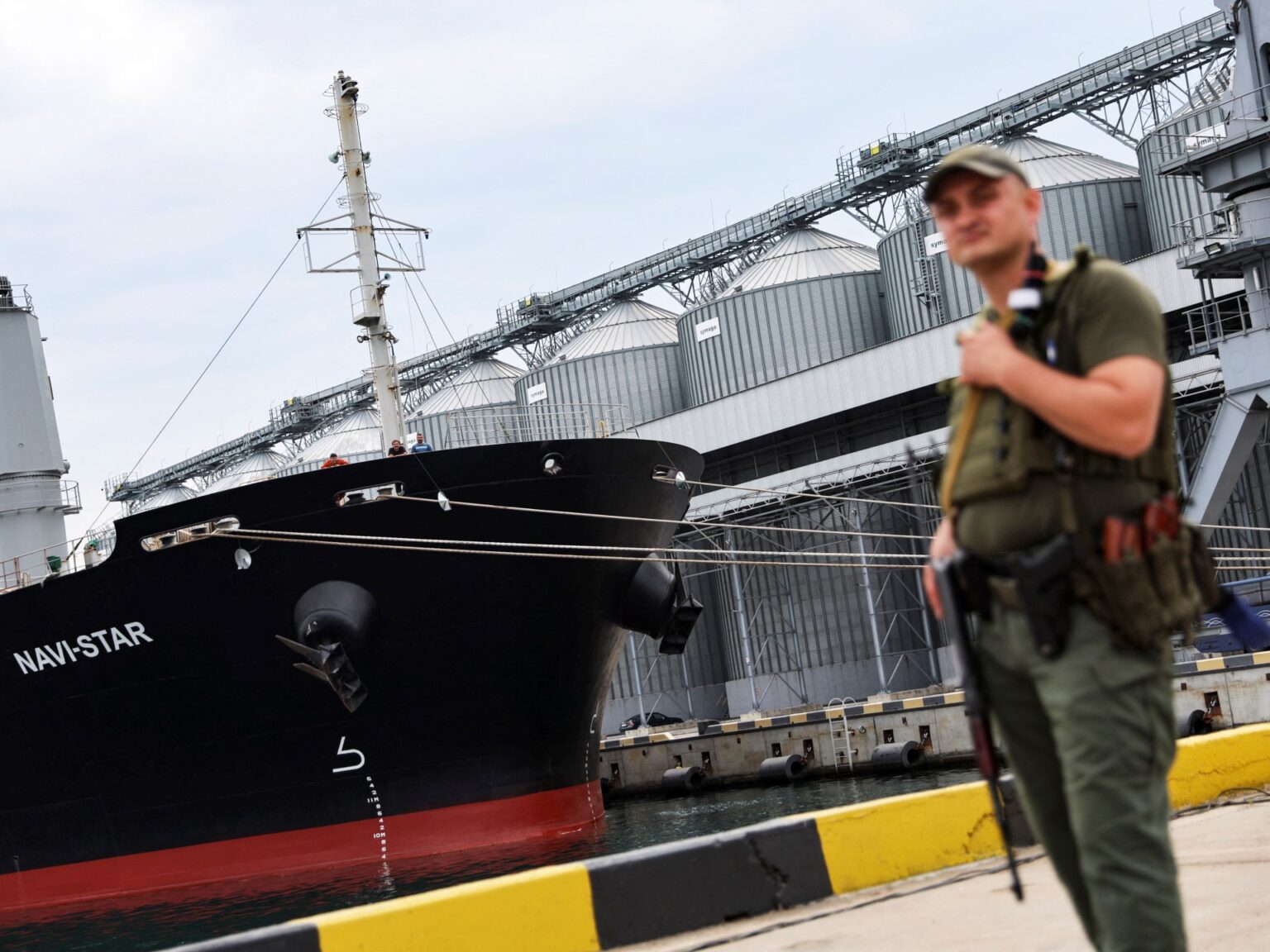Ukraine has accused Russia of unleashing a series of missile strikes on commercial vessels carrying Ukrainian grain in the Black Sea, threatening to disrupt a period of relative calm which has helped to stabilise global food prices.
This is not the first time Russia has been accused of taking aim at vessels carrying grain.
Which ships have been struck?
On Monday, a missile hit the Optima, a Palau-flagged vessel which had left the southern Ukrainian city of Odesa, killing one crew member and injuring five.
It was the second attack on a ship carrying grain exports in as many days. On Sunday, the Saint Kitts and Nevis-flagged Paresa was hit as it carried a cargo of 6,000 tonnes of corn.
Ukraine’s Deputy Prime Minister Oleksiy Kuleba accused Moscow of attempting to “destroy shipping in the Black Sea guaranteeing food security”, while Foreign Minister Andrii Sybiha said Russia had employed a “deliberate terrorist tactic”.
Prior to these two strikes, Ukraine accused Russia of striking a civilian grain vessel for the first time in September. That was when the Aya bulk carrier was targeted in Black Sea waters close to NATO member Romania.
Ukrainian President Volodymyr Zelenskyy said the Aya, which was carrying grain to Egypt, had left the port of Chornomorsk and was hit just after it left Ukrainian territorial waters. Sybiha, the foreign minister, said the strike was “a brazen attack on freedom of navigation and global food security”.
Before these strikes on ships, commercial vessels had avoided any major damage as Russian missiles were being directed towards Ukraine’s port infrastructure.
Moscow has repeatedly denied that it attacks civilian targets and Russia’s Ministry of Defence did not comment on the strikes on the grain ships.
How have Ukraine’s grain exports been affected by the war with Russia?
Ukraine, a leading global grain exporter, has battled to keep food supplies flowing during the war with Russia.
When Russia began its invasion in February 2022, it mounted a blockade of all of Ukraine’s Black Sea ports. Global food prices hit an all-time high the following month, with reverberations felt by consumers as far away as Lebanon, Somalia and Egypt.
Shipments were revived in July 2022 under the Black Sea Grain Initiative, a deal mediated by the United Nations and Turkey that allowed for commercial food and fertiliser exports from Ukraine, until Russia exited the agreement one year later.
Since then, Ukraine has been exporting grain using its own corridor, which passes through the territorial waters of Romania, Bulgaria and Turkey. Kyiv has been able to operate the corridor without Russia’s blessing, resuming the shipment of high volumes of agricultural products to its pre-war markets of Asia and Africa.
According to data from Lloyd’s List, the near-300-year-old shipping journal based in London, the total capacity of all foreign grain vessels arriving in Ukraine during the first quarter of 2024 – including ports on the Black Sea and the Danube river – was 25.1 million tonnes deadweight, a 78 percent rise on the same period in 2023, when the Russia-backed corridor was in place.
But Pavlo Martyshev, an expert in food markets at the Kyiv School of Economics, said Russia has also heavy sway over world grain markets, in competition with Ukraine.
Data shows Russia set a new wheat export record in the 2023-2024 marketing year, shipping over 55.4 million tonnes and increasing supplies to several Asian countries.
“The recent attacks could affect Ukraine’s competitiveness,” making Russian exports more profitable and benefitting its war machine, Martyshev told Al Jazeera. “The more money comes in, the more Russia can buy weapons for the war.”
Why is Russia striking commercial grain ships?
Exports are a crucial revenue source for Ukraine’s cash-strapped farmers.
Before the Russian invasion in early 2022, Ukraine was exporting about 6.5 million tonnes of grain overseas every month, according to figures from the Ukrainian Ministry of Agrarian Policy and Food, bringing in revenues of $27.8bn for the year 2021. It was the world’s seventh-largest exporter of wheat and fourth-biggest exporter of barley, according to the Foreign Agriculture Service of the US Department of Agriculture.
Grain exports had fallen to just over 2 million tonnes per month in mid-2023, just over a year into the war.
The recent strikes on ships bring uncertainty for farmers who “need cash to buy seeds for next winter’s sowing season”, Martyshev said. “They are trying to maximise their own profits as planting depends on their earnings now.”
Alongside eroding Ukrainian revenues at a critical time, the recent strikes will cause insurance premiums to rise and make it less appealing for foreign shippers in agricultural commodities to deal in Ukrainian grain, said experts.
“It makes it much more difficult psychologically for our traders and exporters to face attacks on their infrastructure, and this creates a bottleneck in our logistic supply chain,” Martyshev added.
Dmitry Gorenburg, a senior research scientist at CNA, a US-based security-focused think tank, told Al Jazeera the repeated attacks suggest the “implicit bargain” behind a period of relative calm in the Black Sea – which enabled Ukraine to operate its corridor without Russia’s approval – may be coming to an end.
“Russia wasn’t targeting grain ships and Ukraine was largely staying away from Russian Navy ships in the eastern Black Sea,” Gorenburg told Al Jazeera, summing up the terms of the unspoken deal.
Ukraine may now respond by resuming drone attacks on Russian assets.
Gorenburg, whose research focuses on Russia’s leadership decision-making processes, said the reasoning behind Moscow’s targeting of grain-exporting ships was not yet clear.
Russia may be emboldened by its recent gains in Donbas, or it may be seeking retaliation for Ukraine’s surprise attack across the border in the region of Kursk, he said.
It may also simply be looking for new ways to weaken Ukraine. “If you can weaken Ukraine economically, that reduces its ability to resist,” Gorenburg said.
Rather than targeting ports, the “intimidation of commercial shippers is a much better way to do that”.
https://www.aljazeera.com/news/2024/10/10/why-is-russia-bombing-ships-carrying-ukrainian-grain?traffic_source=rss


